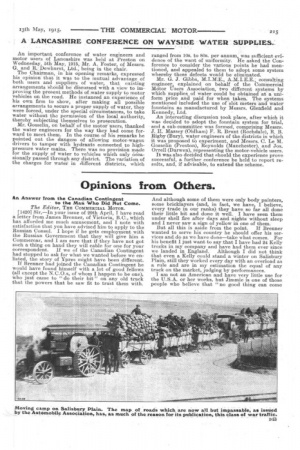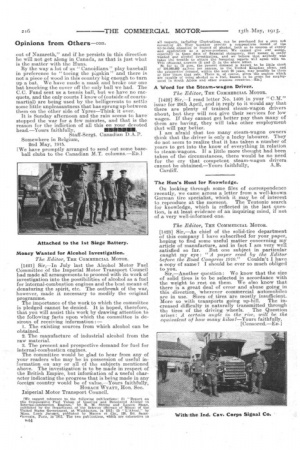Opinions front Others.
Page 13

Page 14

If you've noticed an error in this article please click here to report it so we can fix it.
An Answer from the Canadian Contingent
• to the Man Who Did Not Come. The Editor, THE COD1MEROIAL MOTOR.
[1420] Sir,—In your issue of 29th April, I have read a letter from James Brenner, of Victoria, B.C., which has afforded me much amusement, and I note with satisfaction that you have advised him to apply to the Russian Consul. I hope if he gets employment with the Russian Government that they will give him a Commerear, and I am sure that if they have not got such a thing on hand they will cable for one for your correspondent. If we of the Canadian Contingent had stopped to ask for what we wanted before we enlisted, the story of Ypres might have been different. If Brenner had joined the Canadian Contingent he would have found himself with a lot of good fellows (all except the N.C.O.s, of whom I happen to be one), who just carne to "do their bit" on any old truck that the powers that be saw fit to trust them with.
And although some of them were only body painters, some bricklayers (and, in fact, we have, I believe, every trade in our ranks) they have so far all done their little bit and done it well. I have seen them under shell fire after days and nights without sleep and I never saw a sign of yellow in one of them.
But all this is aside from the point. If Brenner wanted to serve his country he should offer his services and do as we have done—take what comes. For his benefit I just want to say that I have had 24 Kelly trucks in my company and have had them ever since we landed in England. Although I did not think that even a Kelly could stand a winter on Salisbury Plain, still they worked every day with an overload as a rule and are in my estimation the equal of any truck on the market, judging by performances.
I am not an American and have very little use for the U.S.A. or her works, but Jimmie is one of those people who believe that "no good thing can come out of Nazareth," and if he persists in this direction he will not get along in Canada, as that is just what is the matter with the Huns.
By the way a lot of us " Canoidians" play baseball in preference to "toeing the pigskin" and there is not a piece of wood in this country big enough to turn up a bat. Ike have made a mask and broke our one bat knocking the cover off the only ball we had. The C.C. Fund sent us a tennis ball, but we have no racquets, and the only courts I know of (outside of courtsmartial) are being used by the belligerents to settle some little unpleasantness that has sprung up between them on the other side of Ypres—Think it over.
It is Sunday afternoon and the rain seems to have stopped the war for a few minutes, and that is the reason for the infliction of all this on your devoted head.—Yours faithfully, 11111111.••1111, Staff-Sergt. Canadian D.A.P. Somewhere in Belgium,
2nd May, 1915.
[We have promptly arranged to send out some baseball clubs to the Canadian M.T. columns.—En.] Money Wanted for Alcohol Investigation.
. The Editor, THE COMMERCIAL MOTOR.
[1421] Sir,—In July last the Alcohol Motor Fuel Committee of the Imperial Motor Transport Council had made all arrangements to proceed with its work of investigation into the possibilities of alcohol as a fuel for internal-combustion engines and the best means of denaturing the spirit, etc. The outbreak of the war, however, made it necessary to modify the original programme, The importance of the work to which the committee is pledged cannot be denied. It is hoped, therefore, that you will assist this work by drawing attention to the following facts upon which the committee is desirous of receiving information :— 1. The existing sources from which alcohol can be obtained.
2. The manufacture of industrial alcohol from the raw material.
2. The present and prospective demand for fuel for internal-combustion engines.
The committee would be glad to hear from any of your readers who may be in Possession of useful information on any or all of the subjects mentioned above. The investigation is to be made in respect of the British Empire, but inforthation of a useful character indicating the progress that is being made in any Coreign country would be of value.—Yours faithfully, HORACE WYATT, Hon. Sec. perial Motor Transport Council.
an respects, including illustrations, can be purchased for a sum not exceeding 41. They tcgether provide a compendious record of the up-to-date situat:on in respect of alcohol, 'both as to sources of supply and application as a power-producer. We cannot give our assent, especially in these days of financial stringency, that money is really wanted Dta alcohol investigation, and we believe that anybody who takes the trouble to obtain the foregoing reports will agree with us. This c.dhunent answers (1) and ;2) in the above letter. So far as (2) goes, the present demand is known to be little short of 100,000,000 gallorss per annum, is the United Kingdom alone, and the prospective demand, within the next 20 years, may possibly be three or four times that rate. There is, of course, given the engines which are capable of using alcohol Ra a fuel, known to he scope for employment in Smith Africa and other overseas countries.—ED.]
A Word for the Stearn-wagon Driver,
The Editor, THE COMMERCIAL MOTOR.
[1422] Sir,—I read letter No. 1408 in your " C.M." issue for 29th April, and in reply to it would say that there are plenty of trained steam-wagon drivers about, but they will not give their services for low wages. If they cannot get better pay than many of them are having, they will take other employment that will pay better.
I am afraid that too many steam-wagon owners think that the driver is only a lucky labourer. They do not seem to realize that it has taken a number of years to get into the know of everything in relation to steam-wagons. If a little more thought had been taken of the circumstances, there would be no need for the cry that competent steam-wagon drivers cannot be obtained.—Yours faithfully, A.B. Cardiff.
The Hun's Hunt for Knowledge.
On looking through some files of correspondence recently, we came across a letter from a well-known German tire specialist, which it may be of interest to reproduce at the moment. The Teutonic search for knowledge, which is reflected in the last question, is at least evidence of an inquiring mind, if not of a very well-informed one The Editor, THE COMMERCIAL MOTOR.
[1423] Sir,—As chief of the solid-tire department of this company I have subscribed for your paper, hoping to find some useful matter concerning my article of manufacture, and in fact I am very well
satisfied so far. But one subject in particular caught my eye : "A paper read by the Editor before the Road Congress 1010." Couldn't I have a copy of same ? I should be ever so much obliged to you.
Sir,—Another question: We know that the size of solid tires is to be selected in accordance with the weight to rest on them. We also know that there is a great deal of error and abuse going in this direction, wherever commercial automobiles are in use. Sizes of tires are mostly insufficient. More so with transports going up-hill. The increased difficulty is naturally transmitted through the tires of the driving wheels. The Question arises : A certain angle in the rise, will be the equivalent of how many kilos r—Yours faithfully. [Censored.—En.]






















